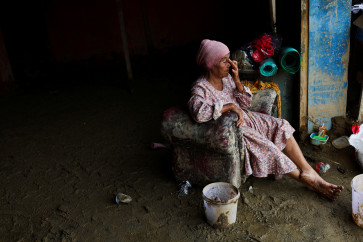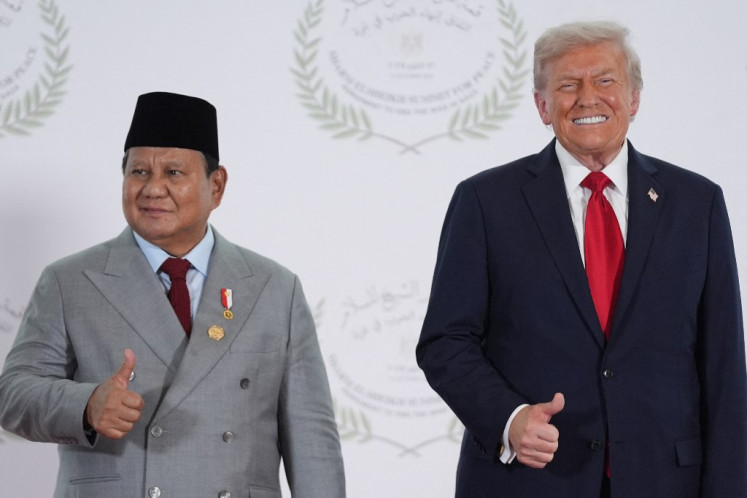Popular Reads
Top Results
Can't find what you're looking for?
View all search resultsPopular Reads
Top Results
Can't find what you're looking for?
View all search resultsBI rate hike keeps rupiah stable, boosts credibility
Apparel jungle: Shoppers check clothes at a shopping center in Central Jakarta on Monday
Change text size
Gift Premium Articles
to Anyone
A
span class="caption">Apparel jungle: Shoppers check clothes at a shopping center in Central Jakarta on Monday. Bank Indonesia recently increased its benchmark rate to 7.75 percent, a move analysts said had a positive impact on the rupiah. JP/DON
The latest hike in Bank Indonesia's (BI) benchmark rate may be detrimental to economic growth, but the move has been seen as a positive step to stabilize the rupiah and support the central bank's credibility, according to analysts.
The rupiah posted its first weekly gain in a month after the central bank increased its benchmark borrowing costs by 25 basis points to 7.75 percent.
BI Deputy Governor Halim Alamsyah said that the central bank hiked its key interest rate to sustain foreign fund inflow and safeguard the rupiah, with the currency appearing 'susceptible' to outflows because of the high foreign ownership of government bonds.
'We see the move as positive for the rupiah, at least in the near-term,' said Santitarn Sathiratai, an economist with Credit Suisse.
'It should generate more attractive yields, while also helping accelerate the narrowing of the current account deficits via demand compression.'
The rupiah strengthened 0.5 percent last week to 12,150 per dollar, according to Bloomberg. In the offshore market, one-month non-deliverable forwards (NDF) rose 0.6 percent to 12,158.
The rupiah's appreciation was an anomaly as it came as most Asian currencies fell against the US
dollar, with the greenback now trading at its strongest level in more than seven years against the Japanese yen.
The South Korean won, Taiwanese dollar, Malaysian ringgit, Indian rupee and Vietnamese dong all weakened against the US dollar last week.
Indonesian bonds also rallied, with the yield on the government's benchmark 10-year bonds dropping 13 basis points, or 0.13 percentage points, this week to 7.8 percent, the lowest level this year. Lower bond yields indicate more expensive pricing among investors.
Foreign investors hold 37 percent of total government bonds traded in the secondary market, official statistics show.
After the BI rate hike, analysts from France-based BNP Paribas and UK-based BNP Paribas lifted their recommendation for Indonesian sovereign bonds to 'overweight' from 'neutral', urging their clients to buy rupiah assets.
The preemptive move of hiking the benchmark BI rate was positive for the credibility of the central bank, which had committed itself to a tight-bias policy stance since earlier this year, Barclays Bank analysts led by Christian Keller explained in a report distributed to clients.
'[The BI rate hike] move is broadly consistent with hikes subsequent to subsidy cuts in 2005, 2008 and 2013,' noted Mallika Chawla, an economist with Goldman Sachs. 'BI has increased its policy rate soon after every significant fuel-price hike in the last fifteen years.'
While providing short-term support for rupiah assets, the move to increase the BI rate was not without its critics, however.
The BI rate hike was 'unnecessary' as it will endanger already low economic growth, said Dian Ayu Yustina, an economist with Bank Danamon.
HSBC economist Lim Su Sian said that lifting the BI rate to 7.75 percent to anchor inflation expectations after the fuel-price hike appeared an 'overly ambitious' move, as inflation was estimated to hover at only 7 percent after the adjustment in subsidized-fuel prices.
'Given the slowing growth, we believe there is not much more room for BI to hike rates, making it vulnerable to capital outflow risks when [US central bank the Federal Reserve] starts raising rates,' warned Euben Paracuelles and Lavanya Venkateswaran, economists with Japan-based fund manager Nomura.










